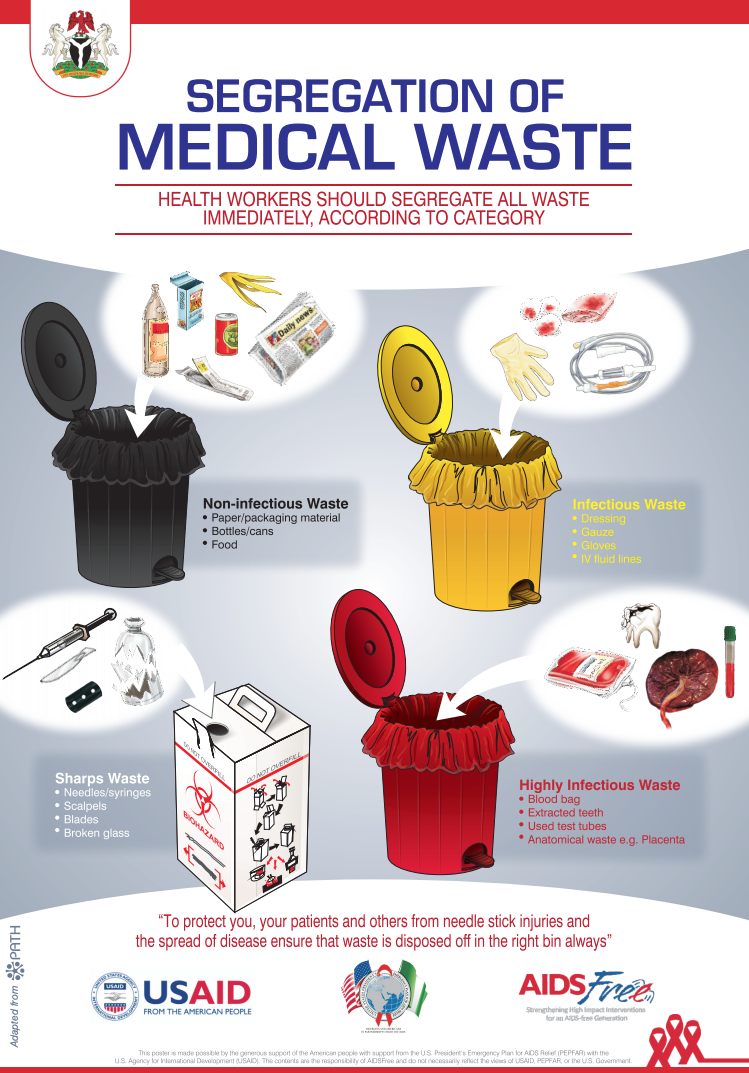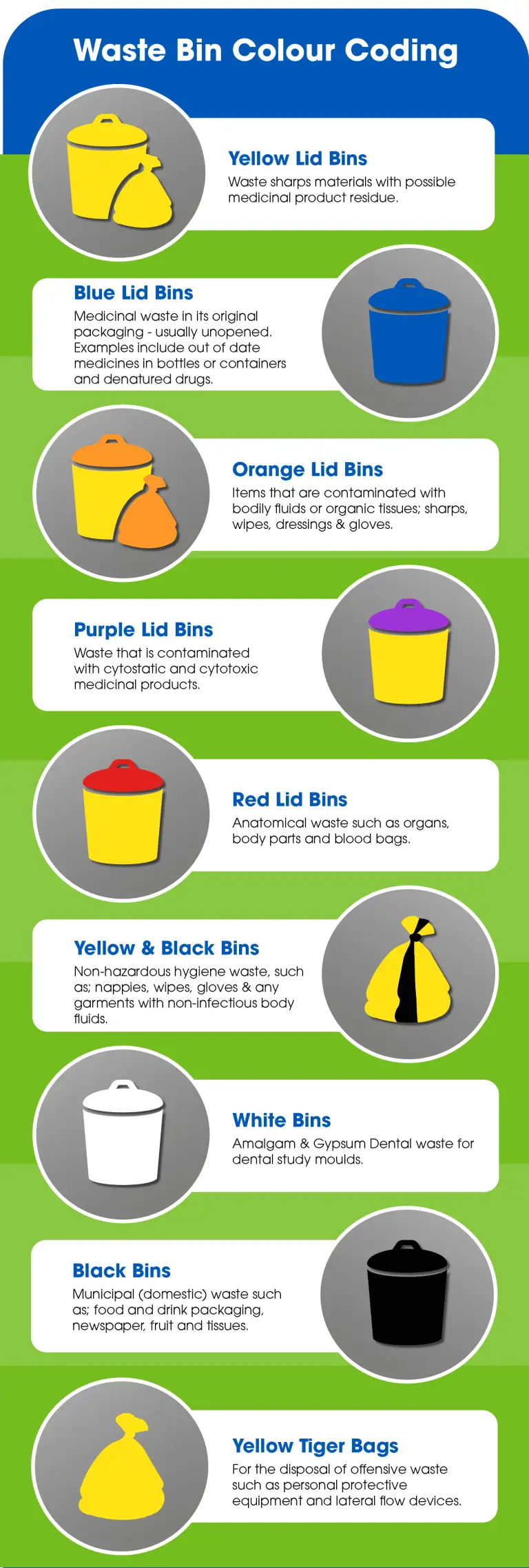Efficient Approaches of Medical Waste Disposal
Effective techniques of clinical garbage disposal are critical in maintaining public wellness and ecological safety. Medical waste, consisting of sharps, pathological waste, and pharmaceutical waste, must be taken care of and disposed of appropriately to avoid the spread of infections and shield the atmosphere. This requires adherence to strict regulations and the execution of professional waste management practices.
Proper segregation of medical waste, safe and protected storage space, reliable therapy and sanitation methods, and environmentally-friendly disposal options are essential components of an effective medical waste disposal system. Professional waste management services play a crucial function in guaranteeing compliance with laws and reducing the dangers connected with improper disposal. By employing these techniques, health care centers can add to a safer and cleaner environment while securing the health of the neighborhood.
Correct Segregation of Clinical Waste
Appropriate partition of medical waste is crucial for making certain the risk-free and effective disposal of these possibly dangerous materials. Clinical waste describes any kind of waste created during healthcare tasks, such as health centers, facilities, research laboratories, and research study facilities. It includes a vast variety of materials, such as used needles, syringes, infected dressings, expired or extra medications, and organic materials.
By setting apart medical waste, healthcare centers can reduce the risk of infections, injuries, and ecological contamination. The process involves classifying waste into different types, such as sharps, infectious waste, pharmaceutical waste, and non-hazardous waste. Each type calls for details handling, product packaging, and disposal approaches to avoid exposure to medical care employees, waste administration workers, and the general public.
To make certain correct partition, health care facilities should create clear standards and supply sufficient training to personnel. This includes enlightening workers on the different waste groups, appropriate product packaging methods, and making use of suitable containers - WasteX Medical Waste Disposal. Furthermore, clear signs and color-coding systems can be implemented to assist in the recognition and partition of various waste kinds
Safe and Secure Storage Space of Medical Waste
Safe and secure storage space of clinical waste is essential for preserving the stability and containment of potentially dangerous materials. Appropriate storage not only safeguards health care workers and the general public from exposure to dangerous substances but also prevents environmental contamination.
To ensure safe storage, medical centers need to follow details standards. Waste must be kept in puncture-resistant and watertight containers that are labeled suitably. These containers ought to be firmly secured to stop any leak or spills. In addition, the storage space area need to be hard to reach and protected to unauthorized employees, minimizing the danger of accidental direct exposure.
Appropriate segregation of clinical waste is likewise crucial for secure storage. Different kinds of waste, such as sharps, infectious materials, and pharmaceutical waste, ought to be divided to stop cross-contamination. This segregation can be accomplished via using color-coded containers or containers.
Regular tracking and inspection of the storage area are essential to recognize any potential threats or violations. This consists of monitoring for signs of damage or degeneration in the containers, guaranteeing proper air flow, and monitoring temperature and moisture levels.
Efficient Treatment and Sanitation Methods

One typically utilized treatment approach is autoclaving, which entails subjecting the waste to high-pressure steam at temperature levels over 121 levels Celsius. One more approach is incineration, which involves shedding the waste at high temperature levels.
Chemical disinfection is one more effective approach for treating medical waste. This approach involves making use of disinfectants such as chlorine compounds, phenolic substances, or hydrogen peroxide to eliminate or suspend virus (WasteX Medical Waste Disposal). Chemical disinfection is usually made use of for liquid waste, such as research laboratory samples or bodily fluids
Recently, different treatment techniques such as microwave disinfection, irradiation, and biological treatment have likewise acquired attention. These techniques supply benefits such as lowered environmental effect and energy intake compared to typical approaches.
Environmentally-friendly Disposal Options
In the realm of medical garbage disposal, considering environmentally-friendly options is crucial. Medical care centers produce a significant quantity of waste, consisting of infectious materials, pharmaceuticals, and chemicals, which can present severe threats to human health and the atmosphere otherwise managed correctly. There are numerous environmentally-friendly disposal choices offered that can help alleviate these dangers.
One such option is reusing. Recycling medical waste includes setting apart and processing certain materials for reuse or repurposing. Plastics, glass, and steel containers can be reused, decreasing the need for new materials and minimizing the amount of waste sent out to land fills. Additionally, some medical care facilities have actually executed recycling programs for certain medical gadgets or devices, additional minimizing waste generation.
One more environmentally-friendly disposal choice is waste-to-energy conversion. This technique includes converting medical waste into energy with processes like incineration or anaerobic digestion. medical waste removal. Incineration, when done appropriately with sophisticated technologies, can create power while lessening dangerous exhausts. Anaerobic digestion, on the other hand, breaks down natural waste in the lack of oxygen, creating biogas that can be used for electrical power or heat generation.

Benefits of Specialist Waste Monitoring Services
One substantial benefit of specialist waste administration solutions is the improved performance in disposing and managing of medical waste. Medical care facilities produce a significant quantity of waste that consists of dangerous products, such as sharp objects, infected items, and potentially transmittable waste. medical waste removal service. Improper handling and disposal of clinical waste pose severe health dangers to workers, patients, and the general public. By making use of professional waste monitoring services, health care centers can ensure that all medical waste is managed and dealt with appropriately, minimizing the danger of contamination and the spread of illness.
Expert waste monitoring services use qualified and knowledgeable employees who are well-informed about the laws and guidelines for medical waste disposal. They have access to specific equipment and tools that enable them to handle various kinds of medical waste safely and effectively. These solutions also have well-established treatments and protocols in position to guarantee that waste is segregated, packaged, transported, and disposed of in conformity with neighborhood, state, and federal guidelines.
Furthermore, specialist waste management solutions can supply medical care facilities with extensive waste management options. They can supply solutions such as waste collection, transport, therapy, and disposal, tailored to the details demands and demands of the center. This gets rid of the worry of managing waste internally, enabling medical care team to concentrate on offering high quality person treatment.
Final Thought
In conclusion, efficient approaches of clinical waste disposal entail correct partition, safe storage, treatment and disinfection, and environmentally-friendly disposal choices. These techniques make certain the secure handling and monitoring of clinical waste, preventing the spread of infections and safeguarding the environment.
Medical waste, including sharps, pathological waste, and pharmaceutical waste, should be dealt with and disposed of correctly to stop the spread of infections and secure the atmosphere.Appropriate segregation of medical waste, protected and safe storage, reliable therapy and sanitation techniques, and environmentally-friendly disposal choices are essential components of an effective clinical waste disposal system. The procedure includes categorizing waste into various kinds, such as sharps, my website contagious waste, pharmaceutical waste, and non-hazardous waste. By using professional waste management solutions, health care facilities can ensure that all clinical waste is taken care of and disposed of effectively, decreasing the threat of contamination and the spread of illness.
Professional waste monitoring solutions utilize seasoned and skilled workers who are knowledgeable concerning the laws and standards for medical waste disposal.